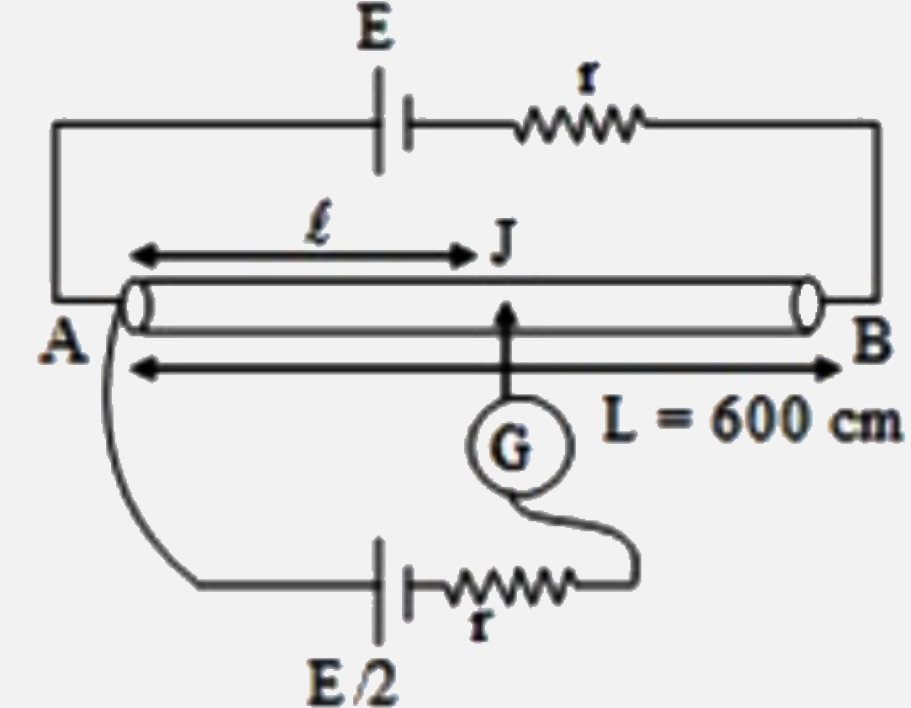If the length of potentiometer wire is increased, then the accuracy in the determination of null point
decrease
increase
remains unaffected
none of these
The correct Answer is:B
To solve the question regarding the effect of increasing the length of a potentiometer wire on the accuracy of determining the null point, we can follow these steps:
1. Understanding Potentiometer Basics:
A potentiometer is an instrument used to measure the potential difference (voltage) across a component by balancing it against a known voltage. The key concept here is the "null point," which is the point where the potential difference is equal and there is no current flowing through the galvanometer.
Hint: Recall that the potentiometer works on the principle of balancing voltages.
2. Potential Gradient Concept:
The potential gradient (ΔV) is defined as the change in voltage per unit length of the wire. It is given by the formula:
ΔV=VL
where V is the total voltage across the potentiometer wire and L is the length of the wire.
Hint: Remember that a steeper gradient means a larger change in voltage over a shorter distance.
3. Effect of Increasing Wire Length:
If we increase the length of the potentiometer wire L, while keeping the total voltage V constant, the potential gradient ΔV will decrease because it is inversely proportional to the length of the wire:
ΔV∝1L
Hint: Think about how spreading the same voltage over a longer distance affects the voltage change per unit length.
4. Relation to Accuracy:
The accuracy of the potentiometer in determining the null point is better when the potential gradient is lower. A lower potential gradient means that small changes in voltage can be detected more easily, leading to a more precise determination of the null point.
Hint: Consider how small variations in voltage affect the ability to pinpoint the null point.
5. Conclusion:
Therefore, as the length of the potentiometer wire increases, the potential gradient decreases, leading to an increase in the accuracy of the determination of the null point.
Final Answer: The accuracy in the determination of the null point increases.
A potentiometer is an instrument used to measure the potential difference (voltage) across a component by balancing it against a known voltage. The key concept here is the "null point," which is the point where the potential difference is equal and there is no current flowing through the galvanometer.
The potential gradient (ΔV) is defined as the change in voltage per unit length of the wire. It is given by the formula:
ΔV=VL
where V is the total voltage across the potentiometer wire and L is the length of the wire.
If we increase the length of the potentiometer wire L, while keeping the total voltage V constant, the potential gradient ΔV will decrease because it is inversely proportional to the length of the wire:
ΔV∝1L
The accuracy of the potentiometer in determining the null point is better when the potential gradient is lower. A lower potential gradient means that small changes in voltage can be detected more easily, leading to a more precise determination of the null point.
Therefore, as the length of the potentiometer wire increases, the potential gradient decreases, leading to an increase in the accuracy of the determination of the null point.
Similar Questions
A potentiometer , with a wire of length 10 m, is connected to an accululator of steady voltage. A lenchlanche cell gives a null point at 7.5 m If the length of the potentiometer wire is increaseed by 1 m, find the new posistion of the balance point.
View SolutionA cell in the secondary circuit gives null deflection for 2.5 m length of a potentiometer having 10m length of wire. If the length of the potentiometer wire is increased by 1m without changing the cell in the primary, the position of the null point wil be
View SolutionIn potentiometer experiment, null point isobtained at a particular point for a cell on potentiometer wire x cm long. If the lengthof the potentiometer wire is increasedwithout changing the cell, the balancing length will (Driving source is not changed)
View SolutionThe wire of potentiometer is made of
View SolutionSensitivity of potentiometer can be increased by
View SolutionThe sensitivity of a potentiometer can be increased by
View SolutionIf the resistance of potentiometer wire is 15r then calculate the balance length l

View SolutionIf the current in a potentiometer increases, the position of the null point will
View SolutionThe length of a potentiometer wire is 10m and a potential difference of 2 volt is applied to its ends. If the length of its wire is increased by 1m, the value of potential gradient in volt/m will be (potential difference across potentiometer wire remain same)
View SolutionLength of a potentiometer wire is kept long and uniform to ahcieve:-
View Solution
